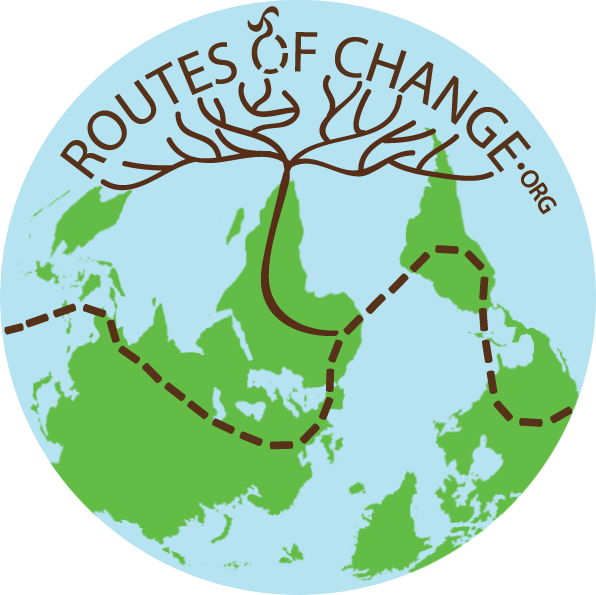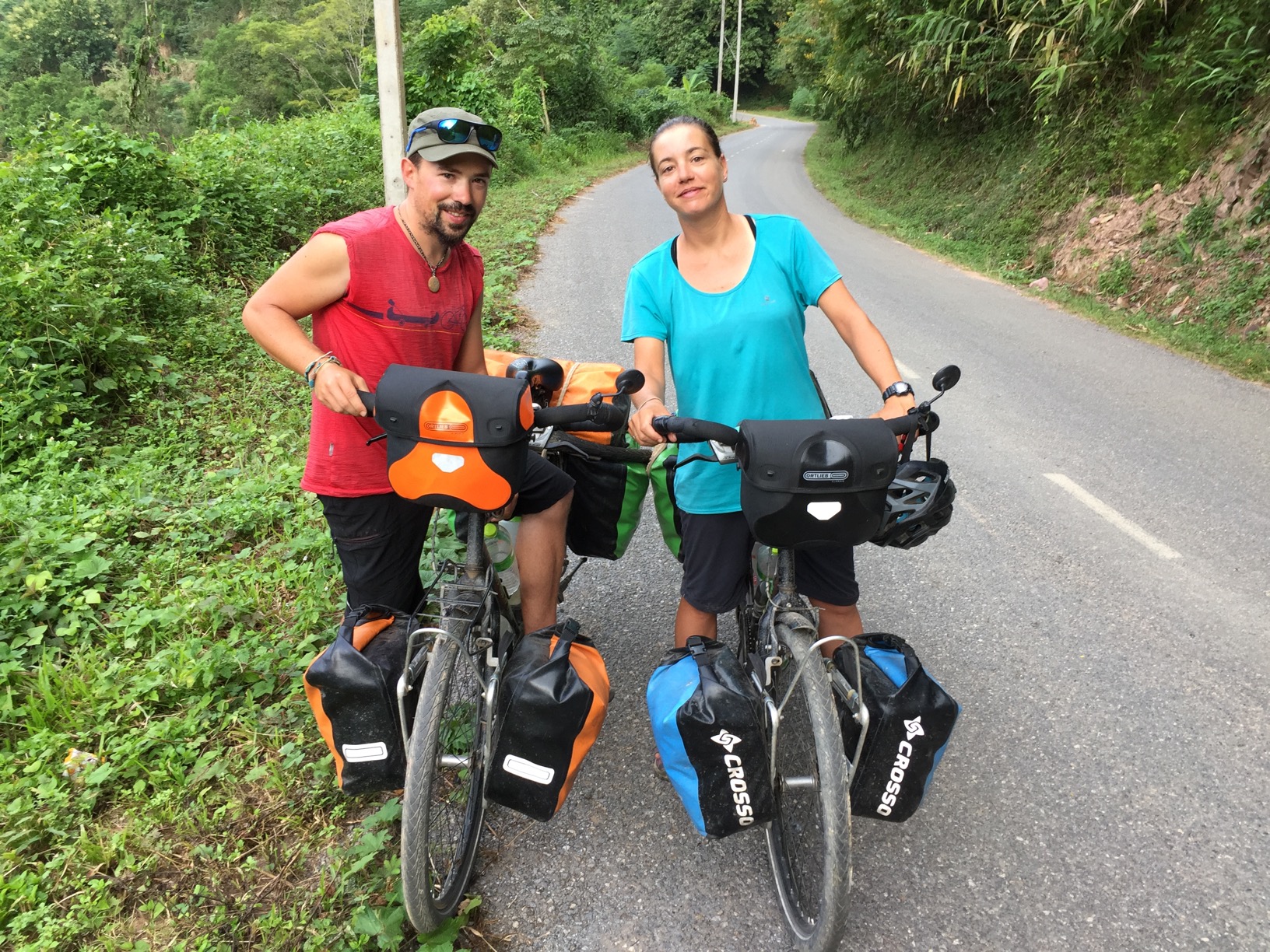Sometimes borders seem like they are just arbitrarily drawn on a map by a colonial artist. Sometimes there are quite clear topographic features where the official borders meet, a river, or a dessert, or a lake. The climb from Vietnam into Laos was one of those. It was a high pass to get to the border where there was very little in sight but forested mountains.
The actual border itself was a billboard welcoming you into Vietnam or Laos respectively. The immigration posts were a few km on either side of it. Perhaps a healthy separation of nations?
When I arrived at the Laos border the guards were on lunch. I would have to wait with the buses and other vehicles who knew they had showed up just a bit too late.
Considering what I had heard about Laos borders this one was easy enough to pass. No bribes. I think I paid a $2 fee which went into the officials pocket. The border is not a place to argue or make a scene for a couple of dollars. I had seen tourists make a fuss over it before and it only leads to a big waste of time and a bit of an embarrassment for everyone involved, if not a larger fine for the fussy pants tourist standing by their morals.
After the 30 km climb from Dien Bien Phu to the border and the two hour lunch break I was ready to roll into Laos. I had a mostly downhill 35 km ride to get to Muang Mai. There was plenty of light left in the day to continue riding but I was happy to rest and enjoy my first day in Laos. I found a small guesthouse by the road for 50,000 Kip (about $7 CAD).
The next morning I got back on the bike early to enjoy the cooler moments of the day.
Laos was a breath of fresh air and more noticeably an earful of peace. The road was less busy and when a car or motorbike did pass they were quite happy doing so without blaring their horn into my ear. Of course the occasional Vietnamese trader would still pass with their friendly ear blasting hello, but that was rare. Laos was mostly quiet.
Around noon that day I cycled across a bridge that spanned the Nam Ou river and settled into the cheapest room I could find in the town of Muang Kai. I had hoped I might find a boat to paddle down the river from here as this was one of the tributaries of the Mekong. While I was looking at my room in the guest house some little kids were playing around in the dirt outside. Shortly after I discovered that one of them had opened a pocket in my pannier and took my bright green tire levers out to play with. After a long search and asking for help from any parent figures in sight I found one of them in the gutter of the main road. I never did find the other one.
After my search I sat down at a little restaurant for some food and met Felix the german. I told him what I was up to and that I was going to start a search for a boat to paddle down the river with. He seemed like a nice enough guy so I invited hm to join. I was surprised when he instantly said yes. I’m not sure if he fully understood what he was signing up for.
The next day we went for a walk all around the town in search of a decent boat to purchase. Unfortunately it didn’t seem like people were that interested in selling, which is not surprising considering many of them are used to provide food or income for their families. They were open to selling them, but for a price much more than they were worth, or so we thought.
The only boat we could find for sale was not in good condition and the guy was asking way too much for it, 6 Million Kip ($650 CAD). He made the mistake of answering this question of mine somewhat honestly, “So how much do you think we will be able to sell this boat for in Vientiane? (The Capital of Laos). He responded, “2 or 3 Million”. Ha! He was probably being generous with that too. It didn’t matter. Even after I pointed out his blunder he would only drop his price one million. I guess he just wasn’t that interested in selling it.
After two days of searching for a boat and having no luck, Felix and I decided to give up on finding one in Muang Khua. I would bike my way to the Mekong in Pak Beng and send him a message if found any good potential boats there. We parted ways not knowing if we would cross paths again.
The road west took me through beautiful green rolling hills dotted with jungle, rice paddies, and fruit farms. It was tough climbing up the hills but the peace and quiet of the roads more than compensated for the challenge. The weather was fairly mild and didn’t reach above 30 most days.
The occasional rainfall cooled me and the pavement down. After one very brief and light rainfall I crested a hill and began a pleasantly twisting downhill into a valley. I guess I had become a bit complacent with the conditions and forgot that I was on some quite narrow 24 cm road bike tires. I came around one corner with a fair amount of speed and instantly my wheels slid from under me and I found myself sliding across the pavement with my bike. Eventually my clothing and skin stopped my slide. I jumped to my feet (happy that it was possible) and pulled myself and my bike off to the side of road to avoid getting hit by the next vehicle that came around that same wet corner.
I inspected the damage and was relieved to feel nothing broken except for a decent section of skin on my hip and a few scrapes in other places. The tape on one side of my handlebars had been torn off and they were twisted off center but otherwise the bike was fine. I was in one piece and grateful to get a soft lesson in going slow around corners when it’s wet and you have thin tires on your bike. I got delicately back on the saddle and continued to ride for most of the day through beautiful farm lands into the busy trading city of Muang Xai. The rest of the 242 km ride from Muang Khua to Pak Beng went by without incident.
I spent a couple of nights in Muang Xai to get a massage and heal my cuts and bruises. The Chinese business presence was very noticeable in the bustling trading town. Before coming to Laos I had heard it was one the least developed countries in Asia. I tend to gravitate towards “undeveloped places”. One of my favourite countries is Bolivia. Perhaps It’s not always the case but it seems that a lack of development tends to coincide with a strong traditional culture. It’s unfortunate that so many people believe that economic development at all costs is the goal of our species. Sure, healthcare and education is great but there is no need to destroy thousands of years of wisdom of the land and people in order to provide it. I was concerned the foreign investing machine was on it’s way to doing just that in Laos.
As I left town and headed towards the Mekong I saw firsthand the large presence of those business interests. The smaller traditional rice paddies and vegetable farms had been replaced by massive banana plantations that covered the hillsides as far as the eye could see. The amount of chemicals sprayed into these lands was intense. There was plenty of bananas growing but as I walked into one of the plantations it was clear that nothing else was surviving on the land. As I write this I did a quick search and am happy to report that the Laos government has also realized this issue (among others) and has introduced a ban on these large scale environmentally destructive plantations. Many of the Chinese investors are leaving and those that are staying are switching to the less chemical intensive crop of sugar cane. Unfortunately it took the suffering of over 63% of the Laos plantation workers who reported falling seriously ill over a brief six month period.
I can’t say this enough. It is not true that large scale industrial agriculture is needed to feed the world. That is a myth that has been created by the agro-chemical industry and the scientists and governments with big pockets. It is true that short term yields from large monoculture systems can be larger, but study after study confirms that long term yields from small scale organic agriculture are larger, not to mention way more nutritious and healthy for ourselves and the soil. It is absolutely ridiculous to throw away thousands of years of farming wisdom and instead listen to an industry that is simply looking to make money from its chemicals and proprietary seeds. I look forward to growing food again when I have some land to plant seeds in.
I cycled out of banana land and descended a windy road down through the small town of Pak Beng to the shores of the mighty Mekong River. It wasn’t very wide this far up stream (about 100m), but there was a strong flow and a lot of water moving and swirling around the rocks that peeked out of the muddy waters near the bank. I was struck with a feeling of gratitude for making it here combined with a tinge of fear as to what would happen next. Would I find a boat worthy enough to face the rocks and rapids to come? Find out in the next blog…




















